Faculty
The unusual pace of work at the institute is made possible by the total immersion and total dedication on the part of both students and faculty. All programs are team-taught by experienced instructors, with hourly rotation of staff providing for exposure to a variety of approaches. In addition to our low student-faculty ratio, each student benefits from an assigned adviser and unparalleled access to our entire staff. The principles of team-teaching, individualized instruction, and a very carefully developed structure are some of the major ingredients that have made the programs so successful. The Latin/Greek Institute provides a unique and exciting intellectual environment for all its participants.
There are six to ten faculty members teaching in the Institute each summer.
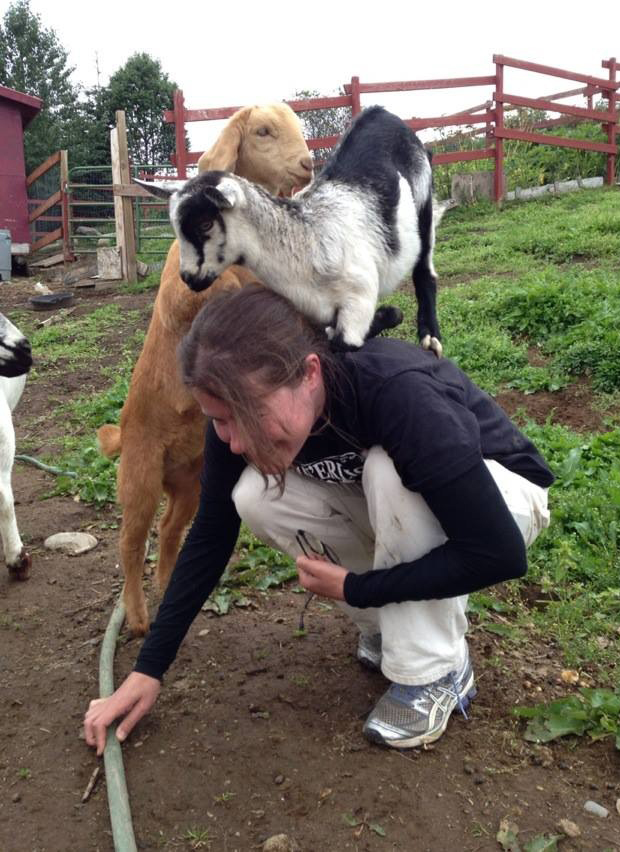
Collomia Charles
Collomia Charles
After receiving her B.A. in liberal arts from St. John's College, Collomia took a bus from Baltimore to New York City with $200 and a backpack filled mostly with books to attend the Basic Greek Program at the institute. That summer she ate mostly bananas, oranges and saltine crackers; called home from the payphones at the New York Public Library; had a crane fall on her apartment building; and learned Greek. It was so much fun, she came back to do the Latin program and applied to graduate school.
Her Ph.D. comes from Boston University, where she wrote a dissertation ("On Such Horses Gods and Heroes Ride") all about the talking horses of Achilles and Boucephalas, Alexander the Great's horse.
In addition to her years teaching at the institute in the Basic Latin, Upper-level Latin and Upper-level Greek Programs, Collomia has taught at Boston University, Boston College, MCI-Norfolk (a men's prison in Massachusetts), Barnard College, Columbia University and many fine living rooms and coffee shops with students as young as seven and as old as 89.
When she's not teaching, Collomia lives on a farm in rural Alaska, splitting firewood, hauling hay, herding goats, tending bees, and working in the garden.
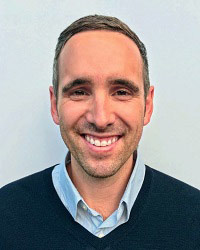
Carlo DaVia
Carlo DaVia
Carlo DaVia is a lecturer at Fordham University, where he received his M.A. in classics and Ph.D. in philosophy. He previously received a B.S. in physics and B.A. in philosophy from UCLA. His research draws upon the wisdom of classical antiquity in effort to improve the ways in which we think and argue about pressing ethical issues today. As a former student of the Latin/Greek Institute, he cannot adequately express its merits. Students not only learn Greek or Latin with remarkable rigor, they also experience studium in its truest sense. So while some sign up for mindfulness retreats, Carlo prefers to spend his summers memorizing principal parts.
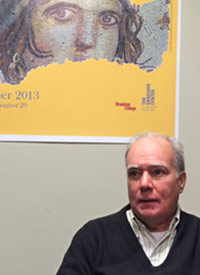
Hardy Hansen
Hardy Hansen
This will be my 42nd summer teaching in the Greek Institute.
After getting a B.A. in classics from Princeton and an M.A. and Ph.D. from Harvard, I spent most of my career at Brooklyn College. I've now retired from Brooklyn and from directing the institute—but not from teaching.
My LGI career began when Floyd Moreland, who founded the Latin Institute in 1973, decided to add a program in Greek. Gerry Quinn and I agreed to write the textbook. In summer 1978 we launched the Greek program, after an unbelievably intense 10 months of drafting and re-drafting every word in the book. By then I had become an institute veteran. Gerry and I had pre-taught every single lesson for an audience consisting of Floyd, Rita Fleischer, and Stephanie Russell, all seasoned instructors in the Latin program. More than once, we had to repeat a class to get the timing right or to make sure that we were completely clear and consistent. I learned a lot about teaching, and I came to understand the collaborative enterprise that is the heart and soul of the institute.
Sometimes people ask me if I don't get tired of teaching the same thing year after year. No, I don't. Every year the institute is completely new. The students arrive, knowing little or nothing of the language. Ten weeks later, they have read authors like Plato and Euripides, Cicero and Vergil, at a scholarly level few students ever attain. Just as important, they have learned what you can accomplish when you give everything to a task. We know where the students will be at the end of those 50 days. Seeing them arrive there is the richest reward for our effort.
Just as Gerry Quinn and I pre-taught everything before that first summer, the faculty are meeting this spring to pre-teach the material and prepare ourselves for Institute classes. It still takes plenty of preparation, even if you've done it many times before.
My main summer recreation is walking all over New York City. I need the exercise, both before and after a day at the LGI. My other extracurricular concern is tapirs.
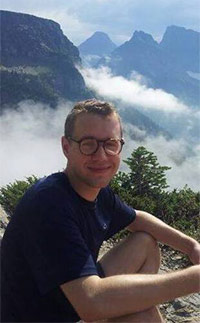
Zach Hayworth
Zach Hayworth
Zach Hayworth is a Ph.D. candidate in Germanic languages and literature at Harvard University. He was a student in Upper-level Greek and Upper-level Latin before becoming faculty at the Latin/Greek Institute in 2018. He graduated summa cum laude from City College (CUNY) in 2016, where he studied English, comparative literature, French, and Italian. His dissertation is on Moses Mendelssohn's late-Enlightenment translation of Plato's Phaedo into German and Rabbinic Hebrew and the influence of that project on Kant's moral philosophy. In addition to complete philological mastery he loves hot yoga and each summer continues his lifelong mission to pet as many dogs in Manhattan as possible.
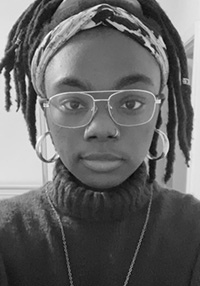
Cianna Jackson
Cianna Jackson
Cianna Jackson is a Ph.D. student in Classical Studies at the University of Pennsylvania. She earned her Master's in Art History and Criticism, and her Bachelor's degree in European Studies and Art History, both from Stony Brook University. She is an alumna of the Basic Greek program (2019) and the Upper Latin program (2020). Her work focuses on the interplay between gender, childhood, and ritual in Greek tragedy and its iconography, with particular attention on Euripides and the Iphigenia myth.
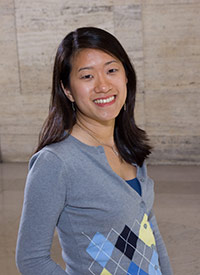
Katherine Lu Hsu
Katherine Lu Hsu
Katherine Lu Hsu is an assistant professor of classics at College of the Holy Cross. She was a student in Basic Greek and taught at the institute, and then its director from 2014-2020. She graduated magna cum laude with her A.B. in classics from Princeton and received her Ph.D. from the University of Michigan in 2013. Her first book, The Violent Hero: Heracles in the Greek Imagination (Bloomsbury 2021), examines depictions of heroic violence in the myths of Heracles from Homer to Aristophanes. She has published on Greek tragedy, literary papyri, the wounded body, and graphic novels. Her favorite thing about teaching at the institute is marveling together with students at the end how they've accomplished more than they ever thought possible.

Katia Kosova
Yekaterina Kosova
Yekaterina Kosova-Krauss is a three-time alumna of the Latin/Greek Institute, and has taught multiple summers of Basic Latin, Basic Greek, and Upper Level Greek. She holds a B.A. in rhetoric and philosophy from U.C. Berkeley and an M.A. in creative writing from San Francisco State University. She studied classics at Columbia University and New York University, receiving her M.A. from the latter in 2011. During the year she is a working artist and carpenter, and teaches Figure Drawing and Anatomy for Artists at Shoestring Studio in Brooklyn. Reading ancient Greek and Latin is one of her main activities even when the Institute is not in session - get in touch with her if you are interested in joining a reading group!
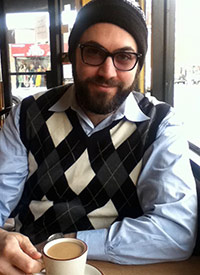
Aramis López
Aramis López
Aramis López is a Ph.D. student in classics at the CUNY Graduate Center. He is also an adjunct at Hunter College, where he teaches Ancient Greek and classics in translation. His research interests include Hellenistic philosophy and poetry as well as Greek metrics. He is also interested in the relationship and possible contacts between Greek and Indian philosophy. He is writing his dissertation on the Greek historian of philosophy, Diogenes Laertius. This will be his seventh summer teaching at the Institute.
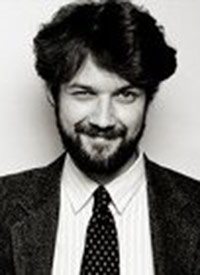
Jeremy March
Jeremy March
Jeremy March is a graduate of the 2000 Upper-level Latin Institute. He is currently a Ph.D. student at the CUNY Graduate Center, having earned an M.A. in classics at the Graduate Center and a B.A. in classics and philosophy from the University of Mary Washington. His interests lie primarily in Greek language and linguistics, Pindar, stylometry and applications of technology in the humanities. Combining his love of classics and technology he developed philolog.us, a Website and iPhone app which offers an interface to the Greek and Latin lexica originally digitized by the Perseus Project. As a former student of the Latin/Greek Institute, March believes the intensive study that the institute demands will have a lasting and rewarding impact on all who undertake it.
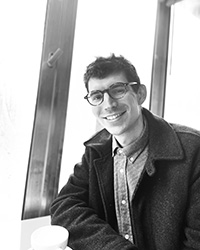
Thom Murphy
Thom Murphy
Thom Murphy, a Tennessee native, is a Ph.D. candidate in the Department of French Literature, Thought & Culture at New York University, where he is at work on a dissertation that considers the role of "nature" in a variety of French and Neo-Latin texts of the early modern period. He also works more broadly on Renaissance poetry and medical thought as well as the development of philology, lexicography, and grammar in the sixteenth century. He received a B.A. in Foreign Languages from Austin Peay State University, and an M.A. and M.Phil. in French Literature from New York University. He is currently a Georges Lurcy Fellow and a pensionnaire étranger in the département des Sciences de l'Antiquité (DSA) at the École normale supérieure in Paris.
A two-time LGI alumnus (morbi amantior quam salutis), he maintains a Latin reading group with Institute friends (now active for several years). When not reading early modern French, or Latin poetry with friends, he is probably à la recherche of the best pain au chocolat in the greater Paris area — so far to be found at Boulangerie Solques on Rue Saint-Jacques. He welcomes any tips.

Bill Pagonis
Bill Pagonis
Having been a student in both the basic Greek program (1990) and the basic Latin program (1991), in one way or another, I have remained close to the institute. I received a B.A. in philosophy from Ohio University in 1990, and came to New York City specifically to attend the institute. I remained in New York to pursue graduate studies at the CUNY Graduate Center. This summer marks my 11th summer teaching at the LGI. I will be teaching in the Upper-level Greek program and, once again, I am looking forward to the rigor and intensity that only the institute offers.
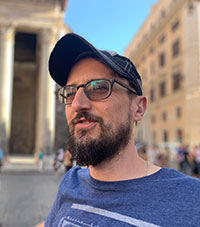
Lucas G. Rubin
Lucas G. Rubin
Lucas G. Rubin was appointed director of the Latin/Greek Institute in the summer of 2020. A two-time alumnus (Basic Latin ’95, Basic Greek ’96), he received his PhD in Classics from the University of Buffalo. An unabashed enthusiast of the ancient (especially Roman) world and a member of Brooklyn College’s Department of Classics, his scholarship is quite eclectic, including forays into Brooklyn history, the occasional inquiry into classics and classical archaeology, as well as consideration of higher education policy and practice. Prior to Brooklyn College, he worked at Columbia University in a range of capacities, from coordinator of archaeology programs to director of professionally focused graduate degrees. When the Institute is not in session, Rubin is the College’s Assistant Dean for Academic Programs, where he administers the College’s extension campus in lower Manhattan and oversees curricular and programming initiatives across campus. He is deeply committed to promoting and advancing the study of Latin and Greek.
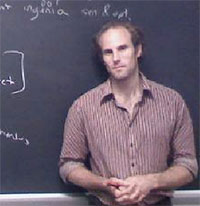
Akiva Saunders
Akiva Saunders
Akiva Saunders began his Latin and Greek studies at the institute and has been a teacher here since 2005. During the rest of the year, he is a pioneer in teaching Latin to the very young; every week he teaches Latin to 450 students in grades 2–6 in the New York City public school system.
His B.A. in linguistics is from Reed College and his M.A. in religion is from Hebrew University, Jerusalem. His training in classics is from the institute and course work at Columbia University. Along the way he attended rabbinical school at the Center for Torah Study and was a fellow at the Shalom Hartman Institute for Talmudic Studies, both in Jerusalem. In his spare time he enjoys basketball and hiking in the backcountry.
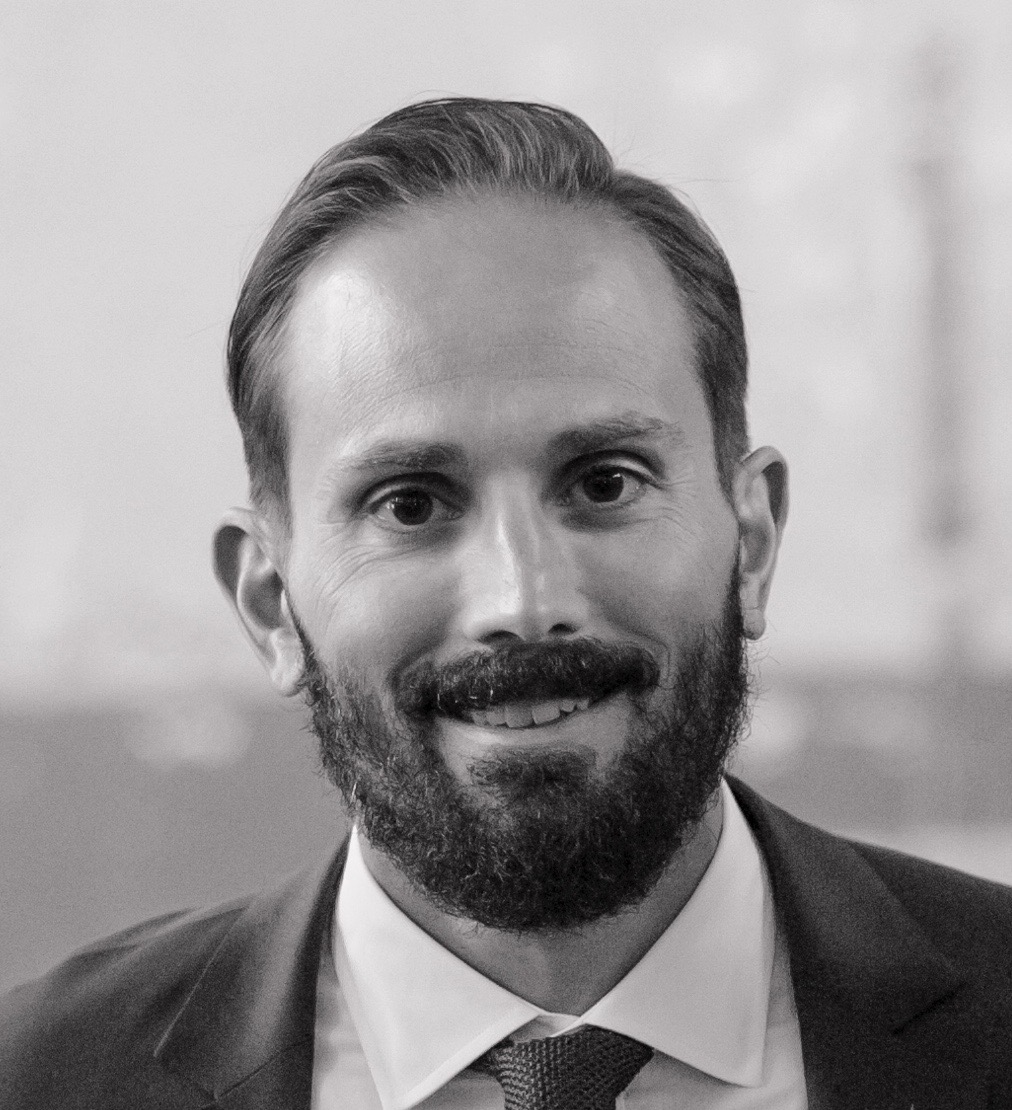
Christopher Simon
Christopher Mark Simon
Christopher Mark Simon is a lecturer in classics within the Department of Comparative Literature and Languages at the University of California, Riverside. He received his A.B. in classics from Princeton University, as well as an M.A., M.Phil., and Ph.D. in classics from Yale University. A former fellow of Thesaurus linguae Latinae, his current research interests broadly embrace Roman historiography and ancient intellectual life, specifically ancient thinking about language, Roman landscapes of fear, and the changing nature of friendship in the first century BC. About him, Sallust might have written: plurumum facere, minime ipse de se loqui. His past students know elephanto beluarum nulla prudentior. This summer marks his seventh year at the LGI.


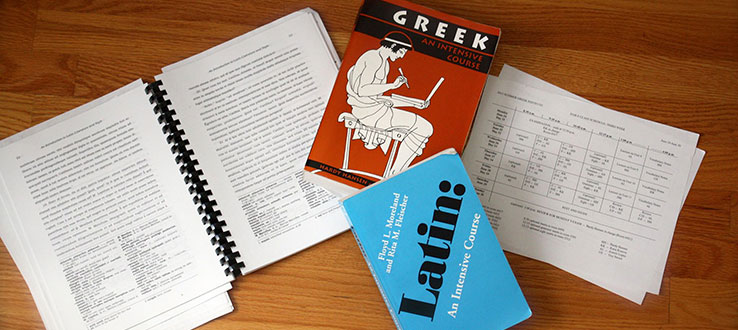
 Follow Us On Twitter
Follow Us On Twitter Visit Us On Facebook
Visit Us On Facebook



